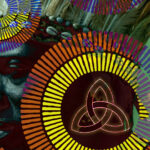When it comes to the Christian church’s relationship to the Old Testament canon, we should remember that Christians do not determine the Old Testament. Rather, they inherit it, as Jesus Christ affirms its authority and lasting significance. The canon of scripture (the list of books that constitute the Bible) came as a result of God providentially acting and revealing his will throughout Israel’s history.
In The Goodly Fellowship of the Prophets, Christopher Seitz says, “The canon emerges from the lived life of Israel under the word of God, faithfully straining to hear that word and obey and live. The Church’s role in the canon is that of gratefully acknowledging witness prepared in prophet and apostle and seeking to honour the providential work of God in Christ from within their own distinctive providential location.”
The church inherits the Old Testament from Israel. This is because the author and finisher of faith, Jesus Christ fulfilled the promises God made through the prophets. Outside of Christ, the church does not have any relationship with God as he revealed himself in the Old Testament. Furthermore, apart from Christ, we have no claim to the Jewish Scriptures as our own.
Old Testament Canon Formation
The formation of the Old Testament starts with Moses and ends with Malachi. The first person to write down God’s word is God. Exodus 32:16 reads, “The tablets were the work of God, and the writing was the writing of God, engraved on the tablets” (see also Exodus 34:1). These tablets were stored in the ark of the covenant to be preserved as God’s word to his people. Wayne Grudem says in his Systematic Theology, “This collection of absolutely authoritative words from God grew in size throughout the time of Israel’s history.” That is, even though God penned the Ten Commandments, God inspired people to write his own words.
The author and finisher of faith, Jesus Christ fulfilled the promises God made through the prophets. Outside of Christ, the church does not have any relationship with God as he revealed himself in the Old Testament
Deuteronomy 31:24-26 tells us that Moses wrote the words of the law in a book. This book was put next to the ark of the covenant. Moses is traditionally credited with the authorship of the first five books of the Bible, the Torah. But Joshua also wrote God’s words (see Joshua 24:26). The additional writing of the Old Testament scripture continues throughout Israel’s history until Malachi in the 5th century BCE. After Malachi, no one spoke with the same authority as the prophets—until Jesus Christ. “Long ago, at many times in many ways, God spoke to our fathers by the prophets; but in these last days he has spoken to us by his Son” (Hebrews 1:1-2).
Jesus and the Old Testament
The Son of God said this regarding the Jewish scriptures “They have Moses and the prophets… If they do not hear Moses and the prophets, neither will they be convinced if someone should rise from the dead” (Luke 16:29-31). Seitz commenting on this passage said, “This is one of the most remarkable passages in the New Testament. It speaks of the sufficiency of the scriptures of Israel to accomplish what even a resurrection from the dead cannot improve upon. It is spoken by one who will return from the dead and who as first act will open these same scriptures and show himself to be teacher, main theme, final end, subject matter … of the scriptures of Israel.”
What about the Apocrypha?
Between Malachi and Jesus, there is a 400 year gap known as the intertestamental period. From this period we get the Apocryphal writings. These writings are found in the Old Testament of ancient Christian Bibles, both in Greek and Latin. But they were not included in the Masoretic Text of the Hebrew Bible. Today, the Roman Catholic Church insists on their continuing authority. They have been the center of discussion throughout church history. Why do some churches not recognise some of the books found in the Roman Catholic Bible as Scripture?
We must remember that the church had nothing to do with the development of the Old Testament Canon. The Church inherited the Old Testament
We must remember that the church had nothing to do with the development of the Old Testament Canon. The Church inherited the Old Testament, as we saw above. The question we have to ask ourselves is: when Paul wrote, “All scripture is breathed out by God” (2 Timothy 3:16; see Romans 1:1-2) what “Scripture” was Paul referring to? Similarly, Jesus spoke about the “Scriptures” (Luke 24:25-27, 44-45). What canon did they have in mind?
The Jewish View of the Apocrypha in the 1st Century
In An Introduction to the New Testament, Carson and Moo make it clear that the Old Testament canon was only closed towards the end of the first century. This took place at the council of Jamnia. They also note that Jamnia council did not add to or subtract from the books. They simply affirmed what the Jews already considered to be Scripture as Scripture. Therefore when Jesus, and the other New Testament authors speak about Scriptures they are speaking about the Old Testament. As Grudem notes, “[the] New Testament quotes the Old Testament Scriptures as divinely authoritative over 295 times, but not once do they cite any statement from the books of the Apocrypha or any other writings as having divine authority.”
Christians can rest in the knowledge that they are using the same Bible used by their Lord Jesus
Grudem also quotes the 1st century Jewish historical Josephus, who wrote, “From Artaxerxes (464–423 BCE) to our own times a complete history has been written but has not been deemed worthy of equal credit with the earlier records, because of the failure of the exact succession of the prophets”. This quote affirms the fact that Jesus and the biblical authors did not regard the Apocrypha as Scripture. Furthermore the people who received the Messianic promise through the prophets (Romans 1:1-3) did not consider these books scripture. In fact the Roman Catholic Church only canonized the Apocrypha in 1546 as a response to the Reformation.
Our Christian Inheritance
Jesus said that the Old Testament is about him. Furthermore, the New Testament authors also used the Old Testament as their primary authority
Christians can rest in the knowledge that they are using the same Bible used by their Lord Jesus. And this Jesus said that the Old Testament is about him. Furthermore, the New Testament authors also used the Old Testament as their primary authority. This was true of their writing as well as their witnessing. Although the apocryphal books are helpful for information about history between the Old and New Testaments, they are not the inspired Word of God.














